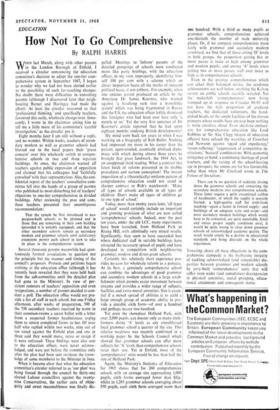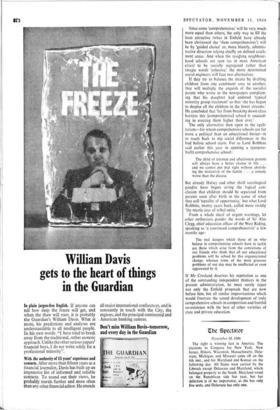How Not To Go Comprehensive
By RALPH HARRIS
Eight months later I am still without a reply, and no wonder. Within weeks, teachers of secon- dary modern as well as grammar schools had blurted out to the local papers their 'grave concern' over this wholesale switch to compre- hensive schools in two and three separate buildings. At once, the chairman warned all teachers against public expression of opposition and claimed that his colleagues had 'faithfully consulted' with their representatives. Alas, the con- fidential report of the teachers' consultative com- mittee fell into the hands of a group of parents who published its most disturbing list of teachers' objections to one-tier comprehensives in divided buildings. After reviewing the pros and cons, these teachers presented their unambiguous recommendation: That the system be first introduced in new purpose-built schools to be planned and in those that are remaining in their own building (provided it is suitably equipped), and that the other secondary schools remain as secondary modern and grammar schools until satisfactory extensions permit each school in turn to take its place in the comprehensive system.
Several thousand parents meanwhile had spon- taneously formed associations to question not the principle but the manner and timing of the council's proposals. Protests and petitions began arriving at the education office (although it has recently been revealed that they were held back from the sub-committee until the detailed plan had gone to the Minister). In view of per- sistent rumours of teachers' opposition and even resignations, a number of parents decided to Con- duct a poll. The education office would not pro- vide a list of staff in each school, but one Friday afternoon, after weeks of preparation, 500 of the 750 secondary teachers received by name in their common-rooms a secret ballot with a letter from a respected former headmistress urging them to return completed forms to her. Of over half who replied within two weeks, nine out of ten voted against the Enfield plan and one in three said they would move, retire or resign if it were enforced. These findings were also sent to the education officer, were never acknow- ledged, and were put before the committee only after the plan had been sent (without the know- ledge of some members) to the Minister in June.
When it became clear that what the education committee's circular referred to as 'our plan' was being forced through the council by thirty-one elected Labour councillors against the twenty- nine Conservatives, the earlier aura of objec- tivity and sweet reasonableness was finally dis- pelled. Meetings to 'inform' parents of the detailed groupings of schools were conducted more like party briefings, with the education officer, in my view improperly, identifying him- self 100 per cent with a scheme which on closer inspection bears all the marks of indecent political haste, if not jobbery. For example, when one anxious parent produced an article by the American Dr James Koerner, who warned against 'a headlong rush into a monolithic system' which was being fragmented in Russia and the US, the education officer loftily dismissed this foreigner who had been over here only 'a month or so. Yet the very first sentence of Dr Koerner's article reported that he had spent eighteen months studying British developments!
My mind went back ten years to when I was working on a biography of Rab Butler. Nothing had impressed me more in his career than the patient, open-minded, essentially civilised diplo- macy with which during almost three years he brought that great landmark, the 1944 Act, to an unopposed third reading. What a contrast this latest lurch of reform presented in its shabby procedures and narrow conception! The instant imposition of a (theoretically) uniform pattern of comprehensive education could not stand in sharper contrast to Rab's watchword: 'Make all types of schools available to all types of children. Don't make all types of children go to one type of school.'
Today, more than twenty years later, 'all types of school' would certainly include an important and growing provision of what are now called 'comprehensive' schools. Indeed, over the past ten years, under the old LCC, many experiments have been launched, from Holland Park to Rising Hill, with admittedly very mixed results. Significantly, they seem to have succeeded best where dedicated staff in suitable buildings have attracted the necessary spread of pupils and have developed in competition with neighbouring grammar, modern and direct-grant schools.
Certainly this relatively short experience pro- vides no case for wholesale reform as a panacea. At its best, a genuinely comprehensive school can combine the advantages of good grammar and secondary modern schools in a large estab- lishment which permits easier movement between streams and provides a wider range of subjects, facilities and extra-mural amenities. Size is essen- tial if a mixed spread of abilities is to yield a large enough group of academic ability to pro- vide a sizeable sixth form—of over a hundred and perhaps nearer two hundred.
Yet even the showplace Holland Park, with over 2,000 pupils, can muster only as many sixth- formers doing 'A' levels as any unpublicised local grammar school a quarter of the size. This relative weakness was recently confirmed in a working paper by the Schools Council which showed that grammar schools can offer more subjects for 'A. levels than comprehensive schools twice their size. Yet in Enfield, most of the 'comprehensive' units would be less than half the size of Holland Park.
Again, the Ministry's Statistics of Education for 1965 shows that for 260 comprehensive schools with an average size approaching 1,000 pupils, sixth forms averaged fewer than fifty; whilst in 1,285 grammar schools averaging about 550 pupils, each sixth form averaged more than one hundred. With a third as many pupils as grammar schools, comprehensives achieved one-thirtieth the number of male university places. Or, if we compare comprehensives more fairly with grammar and secondary modern combined, we find that of those sitting '0' levels in both groups, the proportion getting five or more passes is twice as high among grammar and modern pupils; and among 'A' levels triers getting two or more passes, well over twice as high as in comprehensive schools.
Even in the prestige comprehensives which can select their balanced intake, the academic achievements are well below anything the Kaftan survey on public schools recently revealed. Yet the makeshift 'comprehensives' now being trumped up in response to Circular 10/65 will not have the high proportion of graduate teachers, the dedicated volunteers, the hand- picked heads, or the ample facilities of the chosen pioneers whose results have anyway been nothing to write circulars about. Even idealistic enthusi- asts for comprehensive education like Lord Robbins or Sir Alec Clegg (doyen of education officers) have echoed the warnings of Crowther and Newsom against 'speed and expediency,' 'steam-rollering,' 'suppression of competitive in- stitutions,' bastard' combinations. With economic stringency at hand, a continuing shortage of good teachers, and the raising of the school-leaving age in prospect, the omens are far less favourable today than when Mr Crosland wrote in The Future of Socialism: There can be no question of suddenly closing down the grammar schools and converting the secondary moderns into comprehensive schools. These latter require a quite exceptional calibre of headmaster, of which the supply is severely limited: a high-quality staff for sixth-form teaching—again a factor in limited supply: and buildings of an adequate scale and scope—and most secondary modern buildings which would have to be converted, are quite unsuitable. Until and unless proper supply conditions exist, it would be quite wrong to close down grammar schools of acknowledged academic quality. The result would simply be a decline in educational standards and bring discredit on the whole experiment.
Towering above all these objections to the com- prehensive stampede is the barbarous inequity of tackling acknowledged (and remediable) dis- parities between grammar and modern schools by jerry-built 'comprehensive' units that will stiffer even wider (and cumulative) discrepancies in physical amenities, social grouping, educa- tional attainment and consequent status.
Since some 'comprehensives' will be very much more equal than others, the only way to fill the least attractive (what in Enfield have already been christened the 'slum comprehensives') will be by 'guided choice' or, more bluntly, adminis- trative direction relying chiefly on defined catch- ment areas. And when the resulting neighbour- hood schools are seen (as in most American cities) to be socially segregated rather than (magic word) 'cohesive,' the more determined social engineers will face two alternatives.
If they try to balance the intake by drafting children from one catchment area to another, they will multiply the anguish of the socialist parent who wrote to the newspapers complain- ing that his daughter had endured 'typical minority group treatment' so that 'she has begun to despise all the children in the lower streams.' He concluded that 'far from breaking down class barriers this [comprehensive] school is succeed- ing in erecting them higher than ever.'
The only alternative then open to the egali- tarians—for whom comprehensive schools are far more a political than an educational device—is to reach back to nip social differences in the bud before school starts. For as Lord Robbins said earlier this year in opening a (purpose- built) comprehensive school : The child of talented and affectionate parents will always have a better chance in life . . and we cannot put that right without abolish- ing the institution of the family . . . a remedy worse than the disease.
But already Halsey and other shrill sociological pundits have begun airing the logical con- clusion that children should be separated from parents soon after birth in the cause of what they call 'equality of opportunity,' but what Lord Robbins, twenty years back, called more vividly 'the mystic joys of tribal unity.'
From a whole sheaf of urgent warnings, let other enthusiasts ponder the words of Sir Alec Clegg, chief education officer of the West Riding, speaking as 'a convinced comprehensivist' a few months ago : The real dangers which those of us who believe in comprehensive schools have to tackle are those which arise from the convictions of our friends who think that all our educational problems will be solved by this organisational change, whereas some of the most grievous problems of our day may be unaffected or even aggravated by it.
If Mr Crosland deserves his reputation as one of the outstanding independent thinkers in the present administration, he must surely reject not only the Enfield proposals that are now before him, but all similar improvisations which would frustrate the sound development of truly comprehensive schools in competition and fruitful co-existence with the best of other vatieties of state and private education.







































 Previous page
Previous page